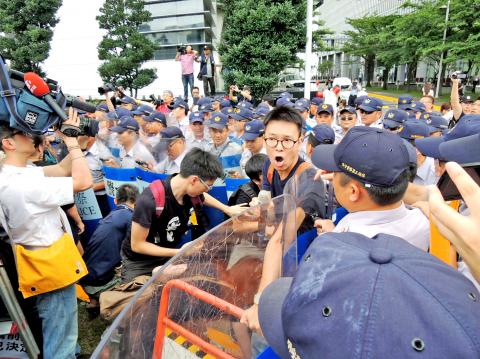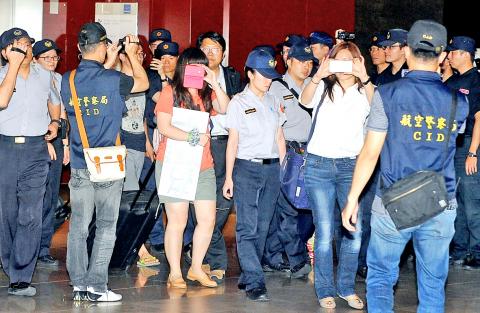Activists yesterday accused the government of abuse of power after a group of “unidentified people” charged into their rooms at the Novotel Hotel in Taiwan Taoyuan International Airport and demanded that they move out before China’s Taiwan Affairs Office Minister Zhang Zhijun (張志軍) was to meet his Taiwanese counterpart, Mainland Affairs Council Minister Wang Yu-chi (王郁琦), at the hotel.
Rights activist and attorney Lai Chung-chiang (賴中強) condemned the government and Novotel over the hotel’s treatment of him as a guest.
“Because of the meeting between Wang and Zhang, we were deprived of our freedom for more than 10 hours,” Lai told the crowd after he was released by the police a little after 7pm. “How many more of our human rights and freedoms should be sacrificed for Zhang? Or to make Beijing happy?”

Photo: Chou Min-hung, Taipei Times
“I have booked the rooms through the regular reservation system and paid for the rooms, so, legally, they are the same as a private home during the period. The police and the hotel staff had no right to do what they did,” he said.
Lai said he booked two rooms for two nights and checked into the hotel on Tuesday night.
However, police and hotel staff knocked on his door at about 9am yesterday, asking them to vacate the rooms, saying there might be “security concerns.”

Photo: Chu Pei-hsiung, Taipei Times
They returned later and forcibly broke into the rooms, saying that since there is only person registered for each room, all other people must leave.
“That doesn’t make sense at all. Isn’t it common practice around the world that only one person needs to register his or her name for a room?” Lai said. “Therefore we refused to leave.”
Another person in the room, Chien Nien-yu (簡年祐), said that the police and hotel staff pretended it was room service the first time they knocked on the door.
Lai said he and six other members of Democracy Tautin were planning to hang protest banners from the windows of their hotel rooms when Zhang arrived, “but we didn’t mean to interrupt the meeting, and it’s our freedom or expression to do what we planned to do as long as we don’t bother people.”
Since the hotel staff and the police failed to have them vacate the rooms before Zhang’s arrival, more than a dozen police officers stood guard outside the rooms, prohibiting them from leaving when the meeting started.
By telephone, the Taipei Times overheard the conversation between Lai and the hotel staff.
When Lai asked if they could leave at 6:15pm, the staff member said: “You have to wait until a little later to leave.”
When Lai turned to a police officer, saying he would like to file a lawsuit of breach of freedom of movement, the officer said Lai must follow him to another place to make the report.
The seven in the room were forced into police cars at 6:57pm. They were released and greeted by a crowd of protesters outside at 7:05pm.
Hours after the incident and with the picture of a broken door latch and the video of hotel staff breaking into the hotel rooms going viral on the Internet, 13 civic groups jointly organized a press conference condemning the state intrusion.
A hotel room booked by a customer is tantamount to the personal residence, said Greg Yo (尤伯祥), a lawyer and member of the Judicial Reform Foundation.
“My house is my castle. This is a principle of freedom and safety of residence that has been finally established after years of authoritarian rule in Taiwan. However, this line has been crossed by the government’s action this morning. What the government is telling the public by its action is that it has no concern whatsoever for such a red line... Then [its] next step would be taking people away on the street without justification,” Yo said.
Foundation executive director Kao Jung-chih (高榮志) attributed the police’s abuse of power to the prosecutors’ connivance, the court’s negligence and the failure of judicial authorities to take on the responsibility of checks and balances.
In response to the complaints, the police said it was hotel staff who broke into the rooms of the guests and that the police happened to be at the site and filmed the whole process.
The National Security Bureau also denied in a press release that its agents were involved in the “break-in” incident, saying the bureau was only in charge of the security of designated individuals.
Additional reporting by Alison Hsiao, Chris Wang and CNA

SECURITY: As China is ‘reshaping’ Hong Kong’s population, Taiwan must raise the eligibility threshold for applications from Hong Kongers, Chiu Chui-cheng said When Hong Kong and Macau citizens apply for residency in Taiwan, it would be under a new category that includes a “national security observation period,” Mainland Affairs Council (MAC) Minister Chiu Chui-cheng (邱垂正) said yesterday. President William Lai (賴清德) on March 13 announced 17 strategies to counter China’s aggression toward Taiwan, including incorporating national security considerations into the review process for residency applications from Hong Kong and Macau citizens. The situation in Hong Kong is constantly changing, Chiu said to media yesterday on the sidelines of the Taipei Technology Run hosted by the Taipei Neihu Technology Park Development Association. With

CARROT AND STICK: While unrelenting in its military threats, China attracted nearly 40,000 Taiwanese to over 400 business events last year Nearly 40,000 Taiwanese last year joined industry events in China, such as conferences and trade fairs, supported by the Chinese government, a study showed yesterday, as Beijing ramps up a charm offensive toward Taipei alongside military pressure. China has long taken a carrot-and-stick approach to Taiwan, threatening it with the prospect of military action while reaching out to those it believes are amenable to Beijing’s point of view. Taiwanese security officials are wary of what they see as Beijing’s influence campaigns to sway public opinion after Taipei and Beijing gradually resumed travel links halted by the COVID-19 pandemic, but the scale of

A US Marine Corps regiment equipped with Naval Strike Missiles (NSM) is set to participate in the upcoming Balikatan 25 exercise in the Luzon Strait, marking the system’s first-ever deployment in the Philippines. US and Philippine officials have separately confirmed that the Navy Marine Expeditionary Ship Interdiction System (NMESIS) — the mobile launch platform for the Naval Strike Missile — would take part in the joint exercise. The missiles are being deployed to “a strategic first island chain chokepoint” in the waters between Taiwan proper and the Philippines, US-based Naval News reported. “The Luzon Strait and Bashi Channel represent a critical access

Pope Francis is be laid to rest on Saturday after lying in state for three days in St Peter’s Basilica, where the faithful are expected to flock to pay their respects to history’s first Latin American pontiff. The cardinals met yesterday in the Vatican’s synod hall to chart the next steps before a conclave begins to choose Francis’ successor, as condolences poured in from around the world. According to current norms, the conclave must begin between May 5 and 10. The cardinals set the funeral for Saturday at 10am in St Peter’s Square, to be celebrated by the dean of the College